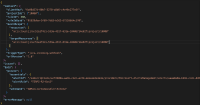-
Type:
Bug
-
Resolution: Unresolved
-
Priority:
Low
-
Component/s: Third Party - Incoming Webhooks
-
Severity 3 - Minor
Issue Summary
When the payload sent to a JIra Automation Webhook trigger contains a field/object named "data", it's value can't be accessed using the smart value webhookData. The exact same JSON path can be parsed correctly if we replace "data" by anything else.
In the following payload, it is impossible to retreive the value at webhookData.data.essentials.alertRule.
{
"schemaId": "AWMonitorCommonAlertSchema",
"data": {
"essentials": {
"alertId": "/subscriptions/acfdb80a-aa1b-c12c-ac3d-eeeeee4e4e4e/providers/Microsoft.AlertsManagement/alerts/aaaa0a0a-bb1b-cc2c-dd3d-e128456e4e4e4e",
"alertRule": "TERPZ-R2-Gen2"
}
}
}
If you replace "data" by anything else, like "potato", the value will be parsed correctly.
This is reproducible on Data Center: (yes) / (no)
Steps to Reproduce
- Create a automation rule with an incoming webhook for the trigger.
- Add a log action and log "{{webhookData.data.essentials.alertRule}}"
- Set up Postman to post to the incoming webhooks url. Include the data set from above
- Send the POST message from postman to the webhook
- Check audit logs
Expected Results
Audit log would show "TERPZ-R2-Gen2" in the log entry
Actual Results
the log entry is blank under the log action
Workaround
Change the key name from "data" to something else and reference that key in the log action

